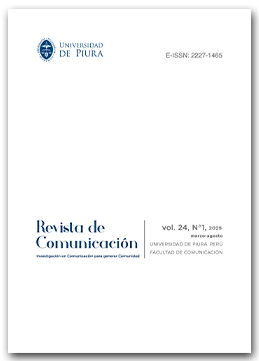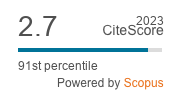Digital Platforms and Right to Information: From Mere Hosts to Responsible Actors
DOI:
https://doi.org/10.26441/RC24.1-2025-3641Keywords:
digital platform, accountability, intermediary, right to information, public sphereAbstract
Despite the apparent neutrality of digital platforms, they exert a significant influence on the mediation of information, which raises questions about their responsibility to guarantee the right to information and democratic sustainability. This article analyses the intermediary role of digital platforms, considering that their presence has transformed the model of public communication. Taking as a starting point Desantes' (1994) defence of information as a human and social good, which engenders a duty for those who issue it, this research argues that digital platforms, like media, must assume a structural responsibility with information. This article explores, through a discussion with the ideas of the main theorists, how platforms have altered public communication, challenging traditional principles of the media and underlining the need to demand operational responsibility from them, as has been done by recent EU regulation.
Metrics
References
Ariel, Y., & Avidar, R. (2015). Information, interactivity, and social media. Atlantic Journal of Communication, 23(1), 19–30. https://doi.org/10.1080/15456870.2015.972404 DOI: https://doi.org/10.1080/15456870.2015.972404
Azurmendi, A. (2015). El proceso de configuración del derecho a la información. En J. I. Bel Mallén & L. Corredoira y Alfonso (Dirs.), Derecho de la información: el ejercicio del derecho a la información y su jurisprudencia (pp. 31–48). Tecnos.
Boix Palop, A. (2016). La construcción de los límites a la libertad de expresión en las redes sociales. Revista de Estudios Políticos, 173, 55–112. https://doi.org/10.18042/cepc/rep.173.02 DOI: https://doi.org/10.18042/cepc/rep.173.02
Brenan, M. (2023). Media confidence in U.S. matches 2016 record low. Gallup. https://news.gallup.com/poll/512861/media-confidence-matches-2016-record-low.aspx
Calvo Macías, R., & Iriarte, M. Á. (2021, marzo). La primavera que no llegó a florecer. Nuestro Tiempo. https://nuestrotiempo.unav.edu/es/grandes-temas/la-primavera-que-no-llego-a-florecer
Carr, C. T., & Hayes, R. A. (2015). Social media: Defining, developing, and divining. Atlantic Journal of Communication, 23(1), 46–65. https://doi.org/10.1080/15456870.2015.972282 DOI: https://doi.org/10.1080/15456870.2015.972282
Chomsky, N. (1988). Manufacturing Consent: The Political Economy of the Mass Media. Pantheon Books.
Christians, C. G., Glasser, T. L., McQuail, D., Nordenstreng, K., & White, R. A. (2009). Normative theories of the media: Journalism in democratic societies. University of Illinois Press. https://doi.org/10.1002/9781118591178.ch19
Christians, C. G., & Fackler, P. M. (2014). The genesis of social responsibility theory. En R. S. Fortner & P. M. Fackler (Eds.), The handbook of media and mass communication theory (pp. 263–280). Wiley. https://doi.org/10.1002/9781118591178.ch19 DOI: https://doi.org/10.1002/9781118591178.ch19
Coeckelbergh, M. (2023). La filosofía política de la IA (L. Álvarez Canga, Trad.). Ediciones Cátedra.
Cohen, J. (1989). Deliberation and democratic legitimacy. En A. Hamlin & P. Pettit (Eds.), The good polity: Normative analysis of the state (pp. 17–34). Blackwell.
Couldry, N. (2008). Mediatization or mediation? Alternative understandings of the emergent space of digital storytelling. New Media & Society, 10(3), 373-391 https://doi-org.ezproxy.unav.es/10.1177/1461444808089414 DOI: https://doi.org/10.1177/1461444808089414
De Gregorio, G. (2022). Digital constitutionalism in Europe: Reframing rights and powers in the algorithmic society. Cambridge University Press. https://doi.org/10.1017/9781009071215 DOI: https://doi.org/10.1017/9781009071215
Desantes Guanter, J. M. (1994). La información como deber. Abaco de Rodolfo Depalma.
Directiva 2000/31/CE del Parlamento Europeo y del Consejo de 8 de junio de 2000 relativa a determinados aspectos jurídicos de los servicios de la sociedad de la información, en particular el comercio electrónico en el mercado interior. https://eur-lex.europa.eu/legal-content/ES/LSU/?uri=CELEX:32000L0031
Eskens, S., Helberger, N., & Moeller, J. (2017). Challenged by news personalisation: Five perspectives on the right to receive information. Journal of Media Law, 9(2), 259–284. https://doi.org/10.1080/17577632.2017.1387353 DOI: https://doi.org/10.1080/17577632.2017.1387353
Feher, A. (2024). How to enforce platform's liability? [Paper presented at The DSA and Platform Regulation Conference 2024 Programme - Day 1, Session 2A: Challenges of realising meaningful transparency and accountability in platform governance]. University of Amsterdam.
Fuchs, C. (2017). From digital positivism and administrative big data analytics towards critical digital and social media research. European Journal of Communication, 32(1), 37-49. https://doi.org/10.1177/0267323116682804 DOI: https://doi.org/10.1177/0267323116682804
Gehl, R. W. (2015). The case for alternative social media. Social Media + Society, 1(2). https://doi.org/10.1177/2056305115604338 DOI: https://doi.org/10.1177/2056305115604338
Gillespie, T. (2010). The politics of ‘platforms’. New Media & Society, 12(3), 347-364. https://doi.org/10.1177/1461444809342738 DOI: https://doi.org/10.1177/1461444809342738
Gillespie, T. (2018). Custodians of the internet: Platforms, content moderation, and the hidden decisions that shape social media. Yale University Press. DOI: https://doi.org/10.12987/9780300235029
Giuffré, I. (2023). Constitucionalismo fuerte y democracia deliberativa: Inconsistencias en Rawls, Dworkin, y Alexy. International Journal of Constitutional Law, 21(5), 1273–1301. https://doi.org/10.1093/icon/moad071 DOI: https://doi.org/10.1093/icon/moad071
Gutmann, A., & Thompson, D. (1996). Democracy and disagreement. Belknap Press of Harvard University Press.
Habermas, J. (2018). Teoría de la acción comunicativa. Editorial Trotta.
Habermas, J. (2022). Reflections and hypotheses on a further structural transformation of the political public sphere. Theory, Culture & Society, 39(4), 145-171. https://doi.org/10.1177/02632764221112341 DOI: https://doi.org/10.1177/02632764221112341
Habermas, J. (2023). Un nou canvi estructural en l'esfera pública i la política deliberativa (L. Figols, Trad.). Edicions 62.
Hall, S. (1982). The rediscovery of 'ideology': Return of the repressed in media studies. En M. Gurevitch, T. Bennett, J. Curran y J. Woollacott (Eds.), Culture, Society and the Media (pp. 56-90). Methuen.
Haugen, F. (2023). La verdad sobre Facebook. (V. Puertollano, Trad.) Deusto.
Helberger, N. (2019). On the Democratic Role of News Recommenders. Digital Journalism, 7(8), 993–1012. https://doi.org/10.1080/21670811.2019.1623700 DOI: https://doi.org/10.1080/21670811.2019.1623700
Helberger, N., Pierson, J., & Poell, T. (2018). Governing online platforms: From contested to cooperative responsibility. The Information Society, 34(1), 1–14. https://doi.org/10.1080/01972243.2017.1391913 DOI: https://doi.org/10.1080/01972243.2017.1391913
Innerarity, D., & Colomina, C. (2020). La verdad en las democracias algorítmicas. Revista CIDOB d'afers internacionals, 124, 11-23. DOI: https://doi.org/10.24241/rcai.2020.124.1.11
Jarvis, J. (2015). El fin de los medios de comunicación de masas: ¿Cómo serán las noticias del futuro? (J. Paredes, Trad.). Gestión 2000.
Kent, M. L. (2015). Social Media Circa 2035: Directions in Social Media Theory. Atlantic Journal of Communication, 23(1), 1–4. https://doi.org/10.1080/15456870.2015.972407 DOI: https://doi.org/10.1080/15456870.2015.972407
Khamis, S., & Vaughn, K. (2011, May 29). Cyberactivism in the Egyptian Revolution: How Civic Engagement and Citizen Journalism Tilted the Balance. Arab Media & Society, 13(3). https://www.arabmediasociety.com/cyberactivism-in-the-egyptian-revolution-how-civic-engagement-and-citizen-journalism-tilted-the-balance/ DOI: https://doi.org/10.70090/SKKV11ER
Kleis Nielsen, R., & Ganter, S. A. (2018). Dealing with digital intermediaries: A case study of the relations between publishers and platforms. New Media & Society, 20(4), 1600-1617. https://doi.org/10.1177/1461444817701318 DOI: https://doi.org/10.1177/1461444817701318
Livingstone, S. (2009). On the mediation of everything: ICA presidential address 2008. Journal of Communication, 59(1), 1–18. https://doi.org/10.1111/j.1460-2466.2008.01401.x DOI: https://doi.org/10.1111/j.1460-2466.2008.01401.x
Marta-Lazo, C. (2023). La alfabetización mediática, vacuna ante la desinformación en la era de las TRIC. Anuario ThinkEPI, 17. https://doi.org/10.3145/thinkepi.2023.e17a47 DOI: https://doi.org/10.3145/thinkepi.2023.e17a47
Martín Algarra, M. (2020). Humanizar la tecnología desde la comunicación. Observatorio Humanidades y Tecnología. https://blogs.uned.es/oht/wp-content/uploads/sites/241/2020/10/Observatorio_Humanidades_Tecnologia_N0.pdf#page=64.09
McQuail, D., & Deuze, M. (2020). McQuail's media & mass communication theory (7ª ed.). Sage.
Micó, J. L., Casero-Ripollés, A., & García-Orosa, B. (2022). Platforms in journalism 4.0: The impact of the fourth industrial revolution on the news industry. En J. Vázquez-Herrero, A. Silva-Rodríguez, M. C. Negreira-Rey, C. Toural-Bran, & X. López-García (Eds.), Total journalism (Vol. 97). Springer. https://doi.org/10.1007/978-3-030-88028-6_18 DOI: https://doi.org/10.1007/978-3-030-88028-6_18
Miguel Bárcena, J. de (2016). Las transformaciones del derecho de la información en el contexto del ciberperiodismo. Revista de Estudios Políticos, 173, 141-168. doi: http://dx.doi.org/10.18042/cepc/rep.173.04 DOI: https://doi.org/10.18042/cepc/rep.173.04
Min, J. (2016). Deliberative democrats as the heirs of Enlightenment: Between Habermas and Dewey. En Thinking about the Enlightenment (1ª ed., pp. 17). Routledge. https://doi.org/10.4324/9781315627540 DOI: https://doi.org/10.4324/9781315627540
Mitchell, A., Simmons, K., Matsa, K. E., & Silver, L. (2018, January). Publics globally want unbiased news coverage, but are divided on whether their news media deliver [Report]. Pew Research Center. https://www.pewresearch.org/global/2018/01/11/publics-globally-want-unbiased-news-coverage-but-are-divided-on-whether-their-news-media-deliver/
Morris, M., & Ogan, C. (1996). The Internet as mass medium. Journal of Computer-Mediated Communication, 1(4). https://doi.org/10.1111/j.1083-6101.1996.tb00174.x DOI: https://doi.org/10.1111/j.1083-6101.1996.tb00174.x
Nemitz, P., & Pfeffer, M. (2021). Determining our technological and democratic future: A wish list. En M. Moore & D. Tambini (Eds.), Regulating big tech: Policy responses to digital dominance (pp. 1-16). Oxford Academic. https://doi.org/10.1093/oso/9780197616093.003.0016 DOI: https://doi.org/10.1093/oso/9780197616093.003.0016
Neuberger, C. (2022). Journalismus und Plattformen als vermittelnde Dritte in der digitalen Öffentlichkeit. Kölner Zeitschrift für Soziologie, 74(Suppl 1), 159–181. https://doi.org/10.1007/s11577-022-00832-9 DOI: https://doi.org/10.1007/s11577-022-00832-9
Neuberger, C., Bartsch, A., Reinemann, C., Fröhlich, R., Hanitzsch, T., & Schindler, J. (2019). Der digitale Wandel der Wissensordnung: Theorierahmen für die Analyse von Wahrheit, Wissen und Rationalität in der öffentlichen Kommunikation. Media Perspektiven, 7, 345–354. https://doi.org/10.5771/1615-634X-2019-2-167 DOI: https://doi.org/10.5771/1615-634X-2019-2-167
Newman, N., Fletcher, R., Eddy, K., Robertson, C. T., & Nielsen, R. K. (2023). Digital news report 2023. Reuters Institute for the Study of Journalism, University of Oxford.
Nielsen, R. K., & Ganter, S. A. (2022). The rise of platforms. En The power of platforms: Shaping media and society (pp. 23–42). Oxford Academic. https://doi.org/10.1093/oso/9780190908850.003.0001 DOI: https://doi.org/10.1093/oso/9780190908850.001.0001
Nieminen, H. (2024). Why we need epistemic rights. En M. Aslama Horowitz, H. Nieminen, K. Lehtisaari, & A. D'Arma (Eds.), Epistemic rights in the era of digital disruption (pp. 1–20). Palgrave Macmillan. https://doi.org/10.1007/978-3-031-45976-4_2 DOI: https://doi.org/10.1007/978-3-031-45976-4_2
Noam, E. (2021). Does media management exist? En P. Faustino (Ed.), Media industry dynamics (pp. 1–20). MediaXXI.
Papaevangelou, C. (2024). Funding intermediaries: Google and Facebook’s strategy to capture journalism. Digital Journalism, 12(2), 234–255. https://doi.org/10.1080/21670811.2022.2155206 DOI: https://doi.org/10.1080/21670811.2022.2155206
Poell, T. (2020). Three challenges for media studies in the age of platforms. Television & New Media, 21(6), 650-657. https://doi.org/10.1177/1527476420918833 DOI: https://doi.org/10.1177/1527476420918833
Racimo, F. M. (2006). Democracia deliberativa: Teoría y crítica. Ad-Hoc.
Radsch, C. (2023). Platformization and media capture: A framework for regulatory analysis of media-related platform regulations. UCLA Journal of Law & Technology, 28(2), 175–223. https://ssrn.com/abstract=4397263
Rawls, J. (1993). Political liberalism. Columbia University Press.
Reglamento (UE) 2022/2065 del Parlamento Europeo y del Consejo de 19 de octubre de 2022 relativo a un mercado único de servicios digitales y por el que se modifica la Directiva 2000/31/CE (Reglamento de Servicios Digitales). https://www.boe.es/doue/2022/277/L00001-00102.pdf
Romm, T. (2019, October 17). Zuckerberg: Standing for voice and free expression [News article]. The Washington Post. https://www.youtube.com/watch?v=2MTpd7YOnyU
Rosanvallon, P. (2011). Democratic Legitimacy: Impartiality, Reflexivity, Proximity. Princeton University Press. https://www.jstor.org/stable/j.ctt7stdc DOI: https://doi.org/10.23943/princeton/9780691149486.001.0001
Salonen, M. (2024). Revising the understanding of gatekeeping theory. University of Jyväskylä.
Sandvig, C. (2015). The Social Industry. Social Media + Society, 1(1). https://doi-org.ezproxy.unav.es/10.1177/2056305115582047 DOI: https://doi.org/10.1177/2056305115582047
Seeliger, M., & Sevignani, S. (2022). A New Structural Transformation of the Public Sphere? An Introduction. Theory, Culture & Society, 39 (4), 3-16. https://doi.org/10.1177/02632764221109439 DOI: https://doi.org/10.1177/02632764221109439
Seipp, T. J., Helberger, N., de Vreese, C., & Ausloos, J. (2023). Dealing with opinion power in the platform world: Why we really have to rethink media concentration law. Digital Journalism, 11(8) 1542–1567. https://doi.org/10.1080/21670811.2022.2161924 DOI: https://doi.org/10.1080/21670811.2022.2161924
Sevignani, S. (2022). Digital Transformations and the Ideological Formation of the Public Sphere: Hegemonic, Populist, or Popular Communication? Theory, Culture & Society, 39(4), 91-109. https://doi.org/10.1177/02632764221103516 DOI: https://doi.org/10.1177/02632764221103516
Silverstone, R. (2002). Complicity and collusion in the mediation of everyday life. New Literary History, 33(4), 761-780. https://www.jstor.org/stable/20057755 DOI: https://doi.org/10.1353/nlh.2002.0045
Skovsgaard, M., & Bro, P. (2011). Preference, principle and practice: Journalistic claims for legitimacy. Journalism Practice, 5(3), 319–331. https://doi.org/10.1080/17512786.2010.542066 DOI: https://doi.org/10.1080/17512786.2010.542066
Smyrnaios, N., & Baisnée, O. (2023). Critically understanding the platformization of the public sphere. European Journal of Communication, 38(5), 435-445. https://doi.org/10.1177/02673231231189046 DOI: https://doi.org/10.1177/02673231231189046
Soria, C. (1987). Discurso inaugural del curso académico 1987-1988. Universidad de Navarra.
Spindler, G. (2020). Role and liability of online platforms providing digital content and digital services: Some preliminary thoughts, including impact of the digital content directive. SSRN. https://doi.org/10.2139/ssrn.3550354 DOI: https://doi.org/10.2139/ssrn.3550354
Staab, P., & Thiel, T. (2022). Social Media and the Digital Structural Transformation of the Public Sphere. Theory, Culture & Society, 39(4), 129-143. https://doi.org/10.1177/02632764221103527 DOI: https://doi.org/10.1177/02632764221103527
Tambini, D., & Labo, S. (2016). Digital intermediaries in the UK: Implications for news plurality. Info, 18(4), 33-58. https://eprints.lse.ac.uk/66167/ DOI: https://doi.org/10.1108/info-12-2015-0056
The Commission on Freedom of the Press. (1947). A free and responsible press. The University of Chicago Press. https://archive.org/details/freeandresponsib029216mbp/page/n5/mode/2up
Thompson, D. F. (2014). Responsibility for Failures of Government: The Problem of Many Hands. The American Review of Public Administration, 44(3), 259-273. https://doi.org/10.1177/0275074014524013 DOI: https://doi.org/10.1177/0275074014524013
Valle-Jiménez, D. y Pinilla-Escobar, F.-A. (2023). Información, democracia y libertad en la era de la segmentación: apuntes sobre una relación compleja. Forum. Revista Departamento de Ciencia Política, (24), 53–79. https://doi.org/10.15446/frdcp.n24.104385 DOI: https://doi.org/10.15446/frdcp.n24.104385
Valpuesta Gastaminza, E., & Hernández Peña, J. C. (Eds.). (2021). Tratado de Derecho digital. (1ª ed.). Wolters Kluwer.
van Dalen, A. (2023). Algorithmic gatekeeping for professional communicators: Power, trust, and legitimacy (1ª ed.). Routledge. https://doi.org/10.4324/9781003375258 DOI: https://doi.org/10.4324/9781003375258-1
van Dijck, J., & Poell, T. (2013). Understanding social media logic. Media and Communication, 1(1), 2–14. https://ssrn.com/abstract=2309065 DOI: https://doi.org/10.17645/mac.v1i1.70
van Dijck, J., Poell, T., & de Waal, M. (2018). The platform society. Oxford Academic. https://doi.org/10.1093/oso/9780190889760.001.0001 DOI: https://doi.org/10.1093/oso/9780190889760.001.0001
Vara-Miguel, A., & Sánchez-Blanco, C. (2023). The impact of market-driven revenues on the boundaries of journalism. In M. C. Negreira-Rey, J. Vázquez-Herrero, J. Sixto-García, & X. López-García (Eds.), Blurring boundaries of journalism in digital media (Studies in Big Data, Vol. 140, pp. 71–89). Springer. https://doi.org/10.1007/978-3-031-43926-1_5 DOI: https://doi.org/10.1007/978-3-031-43926-1_5
Villaverde Menéndez, I. (1994). Estado democrático e información: El derecho a ser informado y la Constitución Española de 1978. Junta General del Principado de Asturias.
Wagner, Astrid. (2023). Deliberación, polarización y posverdad: Repensar la responsabilidad en la sociedad digital. Quaderns de Filosofia, 10(2), 51-67. https://doi.org/10.7203/qfia.10.2.26616 DOI: https://doi.org/10.7203/qfia.10.2.26616
Williams, R. (1976). Keywords: A Vocabulary of Culture and Society. Oxford University Press.
Yadav, S., Sinha, A., & Kumar, P. (2019). Multi-attribute identity resolution for online social network. SN Applied Sciences, 1(1653). https://doi.org/10.1007/s42452-019-1701-z DOI: https://doi.org/10.1007/s42452-019-1701-z
Zuboff, S. (2019). The age of surveillance capitalism: The fight for the future at the new frontier of power. Profile Books.
Downloads
Published
How to Cite
Issue
Section
License
Copyright (c) 2025 Revista de Comunicación

This work is licensed under a Creative Commons Attribution-NonCommercial-NoDerivatives 4.0 International License.













 Portal de Revistas de la Universidad de Piura.
Portal de Revistas de la Universidad de Piura.